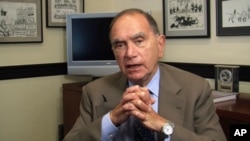A U.S. expert on the Middle East and public policy says the United States and other countries need to be engaged in the region to bring about peaceful changes. As fighting continues in Libya, Former Ambassador Edward Djerejian sees challenges ahead for the National Transitional Council as it seeks to create a new government there.
“I am not pessimistic, but there is a big question mark, because the task is so formidable,” he said.
Djerejian served as U.S. ambassador to both Syria and Israel. Now, he directs the James Baker Institute for Public Policy at Rice University in Houston, Texas, and keeps a close eye on events in the Middle East and North Africa.
He said the United States and other countries seeking change in Libya should be cautious, but engaged.
“We shouldn't rush to support one group over another group. We should be careful on how external foreign assistance funds are channeled and for what purposes. We should be encouraging; we cannot dictate. We should not try to manage the transformation, this is for the Libyan people to do, but where we see positive forces for change, we should support them,” he said.
Djerejian said Syria’s President Bashar al-Assad has disappointed those who had viewed him as a reformer when he took office in 2000.
“That the international community was hoping that this young president would do the right thing, so he was given quite a bit of leeway and yet he did not perform. In a contrary manner, he actually went in the other direction,” said Djerejian.
One of the key outside players in Syria is Iran, which has supported Assad. Djerejian said Iranian interests are threatened by the revolt in Syria.
“The Iranians are obviously very worried that if this regime collapses, they will lose this geopolitical position they have in the Levant and on Israel's borders,” he said.
Djerejian said religious differences will limit Iran's role in Syria. Iran is a Shi'ite Muslim country and Syria is more than 70 percent Sunni. He said the Iranians will not be able to dominate political change in Syria if Assad, who is a member of the Alawite minority, leaves.
As chairman of an advisory group on public diplomacy after the 9/11 terrorist attacks, Djerejian said he saw how people in the Muslim world admired the United States in many ways. But, he said, many were bothered by perceived U.S. favoritism toward Israel and U.S. support of dictators in Arab nations. He said the U.S. response to the events of the past year may help change that.
“I think that with the Arab awakening and the fall of various dictatorships and U.S. support of the forces of change, hopefully positive change, I think that this issue of our being hypocritical in supporting dictatorial regimes will diminish,” he said.
But Djerejian says the United States must take a much more dynamic approach toward Mideast peace if there is to be long-term stability in the region.
“If one is thinking about true, sustainable national security in the region and for Israel's security, let's get on with making an Israeli-Palestinian agreement. That will defuse many of the problems surrounding Israel and I think would enhance Israel's prospects for being integrated into the Middle East in a peaceful manner,” he said.
Djerejian said the time is right for an agreement since the Palestinian leadership appears to be moderate and willing to negotiate, and many Israelis, seeing the growing Palestinian population, realize that it would be in their best interests to forge an agreement now.
Former US Ambassador Optimistic About Arab Democracy
- By Greg Flakus




